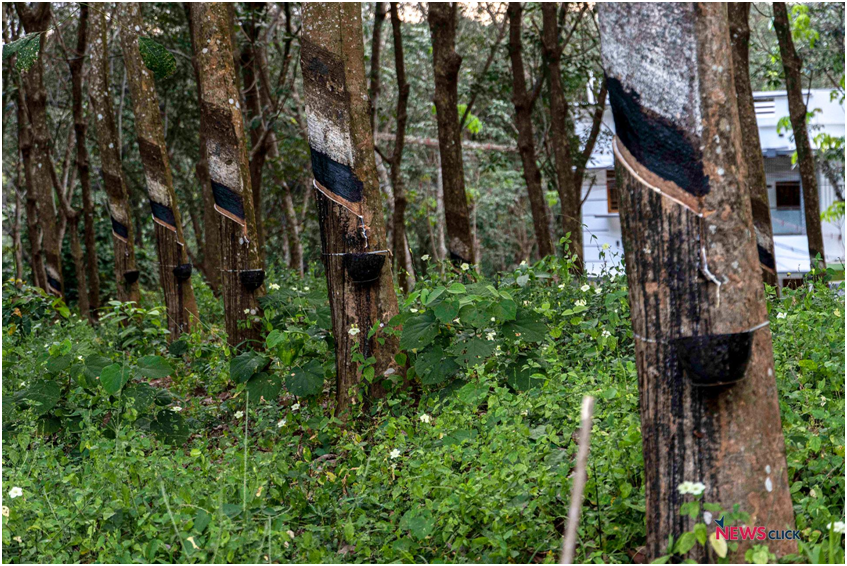TN: Workers in Small Plantations Denied Minimum Wages, Welfare Measures

With the Union government's diluted policies on labour rights and welfare, the workers in the small rubber plantations in the Kanyakumari district are facing more formidable challenges. Minimum wages and social welfare measures remain far from the reach of more than 30,000 workers in the district.
The workers working in harsh conditions face the threat of injuries, accidental deaths, animal attacks and health-related issues in the longer run, which remain unaddressed by the management of the plantations. The management of several private estates continues to shelve different facilities once made available for the workers and their families.
With the presence of trade unions, the workers in the estates make their voices heard, which is only a small segment of the rubber plantation workers in the district. A large percentage of the workers in private estates and small plantations have their tasks cut out on saving their jobs alone.
Since Kanyakumari is the only district in Tamil Nadu to house rubber plantations, the workers' plights are least attended to, though the rubber products bring good revenue for the state.
The steep and unprecedented fall in the cost of rubber has played a key role in taking the sheen out of the rubber industry and reducing employment opportunities.
FIRST LABOUR ACT IN 1951
Kerala and Kanyakumari districts in Tamil Nadu are considered the traditional regions for natural rubber cultivation. Other states like Maharashtra and Northeastern states are considered non-traditional regions.
Though the rubber plantations made their debut in 1902 in the erstwhile Travancore Princely state, which includes southern districts in Kerala and Kanyakumari of Tamil Nadu, a law to protect the rights of the workers was enacted only after independence.
The Plantation Labour Act (PLA), 1951, was passed in the parliament on November 2, 1951, to provide welfare for the labour and regulate work conditions. The act included provisions for regulating working hours, extending welfare measures, health and leaving with wages.
The plantation was defined as ‘any land used or intended to be used for growing tea, coffee, rubber or cinchona which admeasures twenty- five acres or more and whereon thirty or more persons are employed, or were employed on any day of the preceding twelve months.
Despite the implementation of the act, the estates were reluctant to implement the provisions, leading to continuous struggles of trade unions. The working conditions remained unsafe while minimum wages and welfare measures were far from reality. Such a situation continues to prevail even after 70 years of the act coming into force.
‘GOING BACK TO YESTERYEARS’
The plight of the workers in the plantations has hardly changed despite the frequent intervention of trade unions and protests of the workers. There are 25 estates owned by private companies in the district along with the state-owned Arasu Rubber Corporation (ARC), together employing around 2,000 workers.
A major sector in the rubber plantation is the ‘small growers’ who own less than 50 acres as per the Rubber Act 1947.
“There are no trade unions in most of the small plantations, which account for a major share of plantations which employ around 30,000 workers. Minimum wages, other welfare and social security measures remain a dream for them,” said P Natarajan, president of the Kanyakumari District Estate Workers Union (KDEWU).
Most of the small growers deny welfare measures, including employee state insurance, and provident fund, among others.
“The minimum wages and other benefits are extended to workers who are organised under the trade unions. The unorganised workers depend solely on the discretion of the small growers for wages and other benefits,” said M Valsa Kumar, general secretary of KDEWU.
The workers' wages are fixed based on the market price of the rubber, and the workers face the threat of losing their jobs if they demand higher wages and other benefits.
‘INSECURE ON MULTIPLE FRONTS’
The price of rubber has been fluctuating for the last two decades while historically low prices pushed the industry to the brink. India is the 4th largest producer of rubber but also is the 2nd largest consumer in 2020.
The annual report, 2017-18 of the department of commerce informed that the export of plantation crops was reduced due to the contraction of natural rubber by 89%. This had a huge impact on the small growers and the workers depending on such plantations.
“When the market prices reduce, the small growers refrain from employing the workers. The yield they get would not be sufficient to pay the workers at times, leading to losses. This affects the workers badly, and the impact is still felt,” said a plantation worker employed on a small plantation.
Another important aspect which is the least noted is the safety and health-related issues of the plantation workers. Many incidents of occupational injuries and man-animal conflicts remain a challenge for the workers.
“The company estates provide limited medical, housing and educational facilities for the workers and their families, which is totally absent in small plantations. The risk they encounter in hilly and uneven terrains causes permanent disabilities. Such factors receive very minimal attention from the government as well,” Valsa Kumar said.
The workers in the small plantations receive hardly any relief during monsoons and other natural calamities.
“Despite helping in earning revenue for both the state and union governments, the plantation workers receive very little in returns. The negligence of the governments in lending an ear to their plights is disheartening,” Valsa Kumar said.
The policies pursued by the union government on labour welfare and exports have directly affected the workers of the small rubber plantations in Kanyakumari. The state government too has paid little heed to the plights of the workers.
Get the latest reports & analysis with people's perspective on Protests, movements & deep analytical videos, discussions of the current affairs in your Telegram app. Subscribe to NewsClick's Telegram channel & get Real-Time updates on stories, as they get published on our website.
























